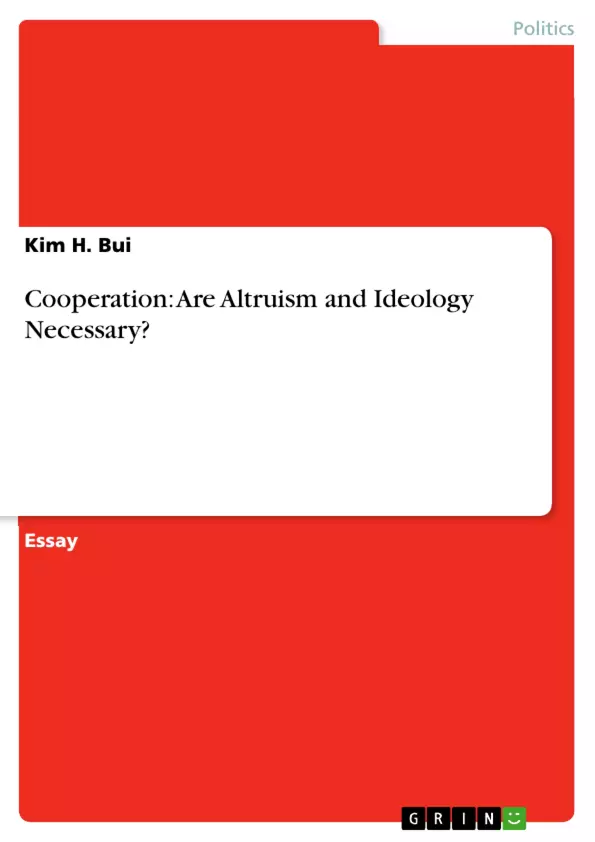Human beings are born social creatures, linked with one another by clusters of dynamic interactions which shape, reinforce or redefine human nature, worldviews and interactions per se. By such design, cooperation—the quality of working jointly towards a common end (Oxford Dictionaries 2012), is often hailed as a desirable, if not decisive trait to the prosperity of society. It is widely regarded that altruism and ideology facilitate cooperation (Putnam 2000). However, that altruism or ideology is a necessary condition for cooperation remains open to question. This paper argues that while a certain class of altruism determines the emergence and sustainability of cooperation, ideology fails to make a convincing case.
Cooperation: Are Altruism and Ideology Necessary?
Introduction
Human beings are born social creatures, linked with one another by clusters of dynamic interactions which shape, reinforce or redefine human nature, worldviews and interactions per se. By such design, cooperation—the quality of working jointly towards a common end (Oxford Dictionaries 2012), is often hailed as a desirable, if not decisive trait to the prosperity of society. It is widely regarded that altruism and ideology facilitate cooperation (Putnam 2000). However, that altruism or ideology is a necessary condition for cooperation remains open to question. This paper argues that while a certain class of altruism determines the emergence and sustainability of cooperation, ideology fails to make a convincing case.
The paper starts with examining the relationships between cooperation vis-à-vis altruism and ideology in the first and second parts. The third part explains the rationality of cooperation through a simplified iterated Prisoners’ Dilemma, and subsequently, restates the significant connection between cooperation and altruism. Finally, conclusions are drawn about momentums behind cooperation.
Cooperation and Altruism
Frequently asked questions
What is the main topic of the text "Cooperation: Are Altruism and Ideology Necessary?"?
The text explores the necessity of altruism and ideology for cooperation in society. It questions whether these factors are essential for fostering cooperative behavior among individuals.
What is the definition of cooperation presented in the text?
Cooperation is defined as the quality of working jointly towards a common end.
What is the author's central argument regarding altruism and ideology's role in cooperation?
The paper argues that while a specific type of altruism contributes to the emergence and sustainability of cooperation, ideology's impact is less convincing.
How does the paper structure its analysis of cooperation and altruism/ideology?
The paper first examines the relationships between cooperation and altruism/ideology. It then explains the rationality of cooperation using the Prisoners' Dilemma. Finally, it draws conclusions about the driving forces behind cooperation.
What is the paper's definition of altruism?
Altruism is defined as a situation where an individual's inclusive wellbeing is positively affected by that of another.
What are the three scenarios presented regarding the interplay between altruism, self-interest, and cooperation?
The three scenarios are: (1) all agents are altruistic, leading to cooperation; (2) at least one self-interested agent exists in an altruistic community, creating an incentive to defect; and (3) all agents are self-interested, making defection the most rational move.
What conclusion does the paper draw about altruism and cooperation based on the three scenarios?
The paper concludes that altruism alone, in its broadest sense, is not sufficient to promote cooperation.
- Citation du texte
- Kim H. Bui (Auteur), 2012, Cooperation: Are Altruism and Ideology Necessary?, Munich, GRIN Verlag, https://www.grin.com/document/207049



